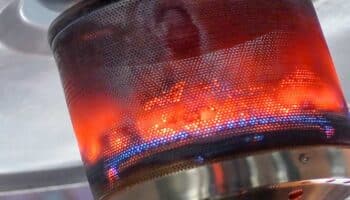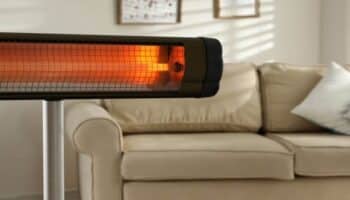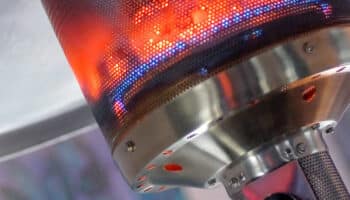We've independently reviewed this article to make sure it's as accurate as we can make it.
To find out more about our article creation and review process, check out our editorial guidelines.
Electric vs propane garage heaters. Which one is better?
Having a steady heat source in your garage while you’re working on a project or doing spring-cleaning, is essential to your comfort. Can you imagine doing either while freezing and shivering?
No, thank you.
This is one of those modern–day solutions that are highly unappreciated, but dearly missed when not present.
If you’re reading this, you’re probably wondering what the differences are between electric and propane models, and what each one can do for you. This is not only a valid question, but quite a common one as well.
Whether you’re planning on replacing your old model or looking into becoming a part of the garage heating world, it’s always useful to have a clear idea of where each model shines, and where they could do better.
This is why I’ve prepared the list below, where you’ll find the most relevant pros and cons of each heater, and some other key aspects to consider down the line. I’m sure this information will help you make the right choice.
Sounds good? Let’s go!
Electric vs Propane Garage Heaters Pros and Cons
You’d be surprised at how different two apparently similar appliances can be. While both models will provide you with enough heat to stay warm and cozy, they both go about their processes in their own special way.
Here are some pros and cons to paint you a clearer picture:
Electric
| Pros | Cons |
| Very energy efficient | More expensive than propane |
| No gas involved, so it’s cleaner than propane | Depends on wall outlet availability |
Propane
| Pros | Cons |
| Portable (No outlet? No problem) | Requires ventilation (due to gas residue in the air) |
| Quicker to heat a room | Canister replacements |
| Requires more maintenance | |
Key Aspects to Consider
Now that you know the advantages and disadvantages of each model, it’s time to take a look at more specific aspects that you should take into consideration prior to making any kind of decision.
#1 Price

This, along with lifespan, is probably the first thing most people think about, and it makes sense. After all, you’re spending your hard-earned money on a brand-new garage heater, so you want to get the best bang for your buck, right?
When it comes to either model, you’ll be happy to hear that you can find a basic version that will do a great job, for as little as $135. And if you want as many bells and whistles as possible, there are models out there upwards of $1,200.
That being said, the price tag on your new unit is not the only thing you should take into account.
There are collateral costs related to using a heater that could quickly turn a great deal, into a bottomless cash pit. You should always keep in mind things such as maintenance and repair costs, as well as kilowatt per hour price in your area, but we’ll get to that later on.
Usually, running an electric heater is more expensive than running a propane one.
#2 Running Costs
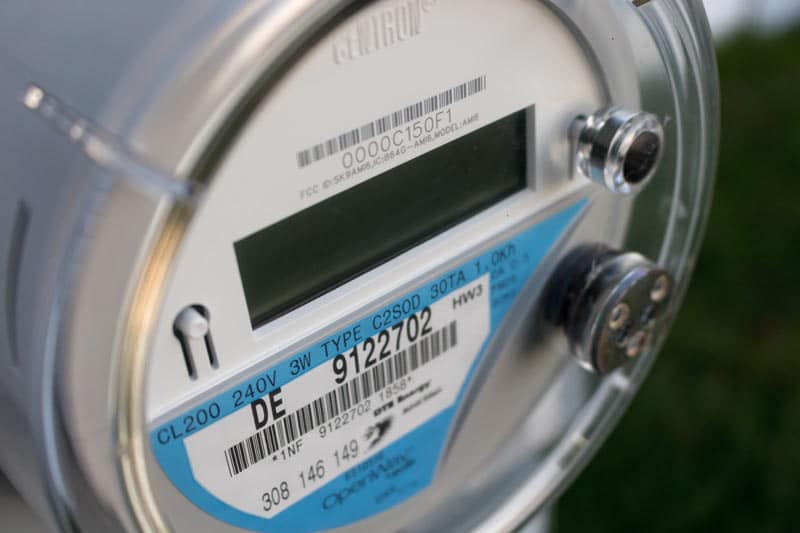
As stated above, there are many factors at play whenever you buy a new appliance to heat up your garage.
What’s the point of saving a lot of money on the unit itself, if you’re going to have to pay a fortune to run it? This is where the differences start becoming clearer between one model and the other.
Depending on where you live, the kilowatt-per-hour price might be higher or lower. However, in general, propane tends to be much cheaper per unit consumed, than electricity. Not to mention that a propane model will still provide you with heat in the event of a blackout.
That being said, propane heaters are a lot harder to maintain and will require more of you to function adequately in the long run.
For these models, you’ll have to constantly replace the gas canister, clean the pilot, and keep the gas line unobstructed. Whereas electric ones will only need you to pay the utilities on time.
#3 Heating Efficiency
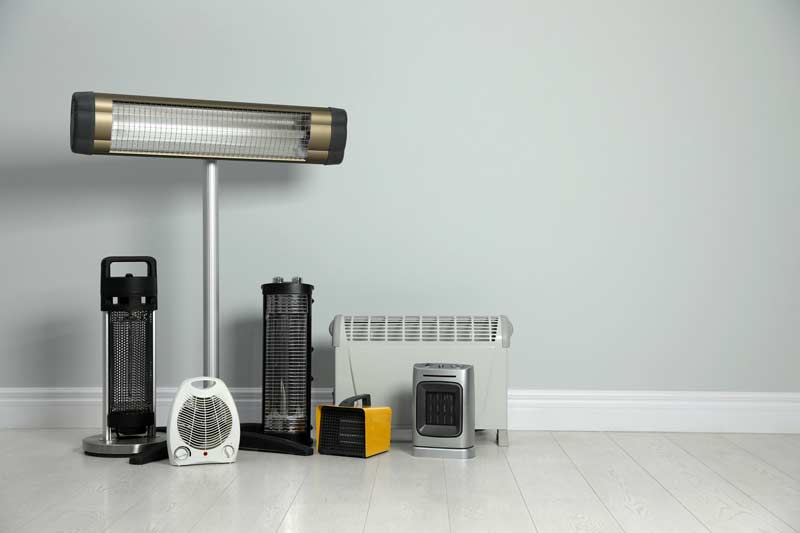
This is something very important that a lot of people fail to consider.
The more efficient an appliance is, the cheaper it will be to run. In case you don’t know what heating efficiency means, let me explain it to you with one of my favorite examples.
Imagine you have a jar of water, and you’re trying to fill a cup with it. If all the water that leaves the jar ends up in the cup, you have 100% efficiency, and any droplet that falls outside the container, is lost efficiency.
The same principle applies to garage heaters. While both electric and propane heaters will do the job just fine, the former are usually 100% efficient, which translates into less power required to heat up your garage.
“But didn’t you say it was cheaper to run a propane model, than an electric one?”. Yes, I did.
Although propane models are not 100% efficient, even with the expected gas losses, running them is still cheaper than their electric counterparts. So, if heating efficiency is really important to you, go electric. Otherwise, choose propane, and save some money every month.
#4 Lifespan
This one’s a tie. Well… sort of.
Both electric and propane garage heaters can last anywhere between 10 and 20 years if properly maintained, but that’s the catch. Regardless of how long your manufacturer might claim their heater to last, it will be hard for it to last as long if you neglect it.
This is where electric models take the lead.
As mentioned above, while propane heaters have their virtues, they’re much harder to maintain and a lot less forgiving of disorder, and poor maintenance, than their electric counterparts.
As long as you pay your bills on time and keep your power sources intact, the latter should require nothing more of you. Whereas the former will always benefit greatly from deep-cleaning every other month, and part replacements whenever needed.
If you know you’re likely to forget to maintain your appliance, or simply don’t like the idea of doing so, go electric. And if you love DIYs, and don’t mind the frequent need for canister replacements, go gas.
At the end of the day, it all comes down to personal preference and user habits.
#5 Safety
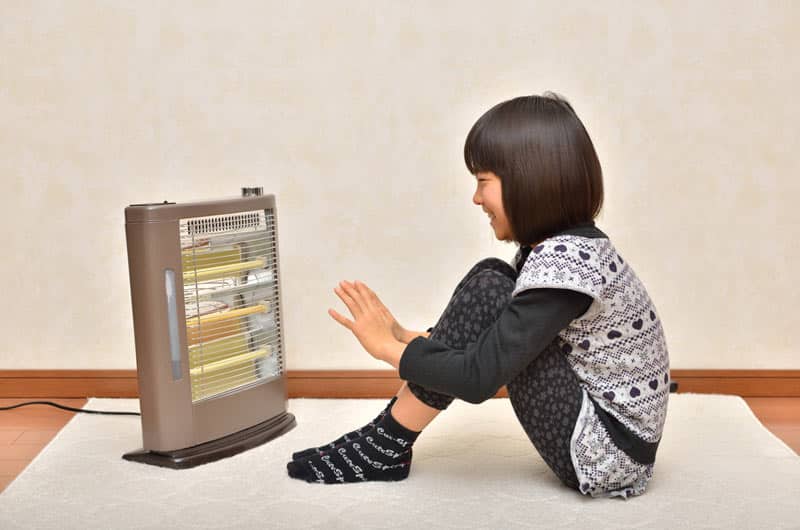
Last, but definitely not least, let’s talk about how safe each model is to operate.
While both versions of this appliance can reach dangerously-high temperatures, only one of them relies on fire to do so. If you live with pets or small children, this could be a strong point in favor of electric units.
And even if you live alone, fire will always be a hazard if you’re not careful.
That being said, both appliances have a myriad of safety mechanisms built into them to prevent accidents, so you should be fine with either one provided that you use them responsibly.
That is… unless you fail to properly maintain your propane unit.
As much as I’d like to tell you that forgetting about cleaning your gas line and pilot, or replacing your canister often won’t be a safety concern, I can’t lie to you. Any of these conditions could put you at risk of a canister explosion derived from pressure buildup, or dangerous gas leaks that could be life-threatening.
Moreover, in order to safely use a propane garage heater, you need a strong source of ventilation, which is not the case for electric units. As stated above, the former do not burn off all the propane drawn from the tank, and the residue ends up in the air.
If you fail to recirculate the air in your garage when this happens, you could find yourself in a very dangerous situation. This is a frequent issue with people who were already sold on propane models, as it means having to spend extra money on installing an air circulation solution.
Before choosing either model, consider your specific situation, and take into account how willing you are to shell out an extra amount of cash for ventilation in exchange for savings in the utility bill over the next few years.
Which One’s Best for You?
Well… there’s no single answer to that question.
When it comes to electric and propane models, it’s hard to say one works better than the other, since it’s like comparing apples and oranges.
If you don’t mind paying more money for electricity every month, want a “greener” heating solution, and love the idea of 100% efficiency, go electric.
Provided that ventilation is not an issue, DIYs are your thing, and you love the idea of independence from wall outlets, propane should be your go-to.
At the end of the day, the best heater for you will be that which solves the most problems and makes your life easier.
Conclusion
You’d think that having numerous options at your disposal would be a good thing. And while sometimes it is, in certain situations, it can be a confusing double-edged sword.
Even more so when you’re comparing two different models of the same appliance.
I hope I’ve been able to provide you with enough useful information in this piece to help you make the right choice. However, this should not be your only source. Visit your favorite online marketplace and read the customer reviews for each model to know what you should expect.
Furthermore, if you know someone who owns either heater, you can also ask them what their experience has been. After all, word of mouth can’t be beaten.
Thank you so much for sticking with me all the way to the end. If you found this article helpful, why not become an expert in the subject through our other incredible resources below?
I wish you nothing but the best!
— Craig.
Frequently Asked Questions
How Long Does a Propane Garage Heater Last?
If cared for properly, maintained timely, and repaired as soon as something seems to be wrong, these appliances can last anywhere between 10–15 years.
Can Propane Garage Heaters Be Used Indoors?
Not unless you have a GREAT ventilation system.
Propane heaters are very efficient, but not in totality. This means that some of the gas coming from the canister will not burn with the flame, but rather leak into the surrounding air. If used in areas without great ventilation, propane heaters can be very toxic.
We strongly advise against using a propane heater indoors. Please make sure that your garage has enough ventilation at all times.
Can Electric Garage Heaters Be Used Outdoors?
Not really.
These appliances are not made to withstand weather conditions like rain, strong winds, and excessive humidity. After all, they’re made for garage use.
If you want a heater for your outdoor living areas, a patio heater could be a great choice!





